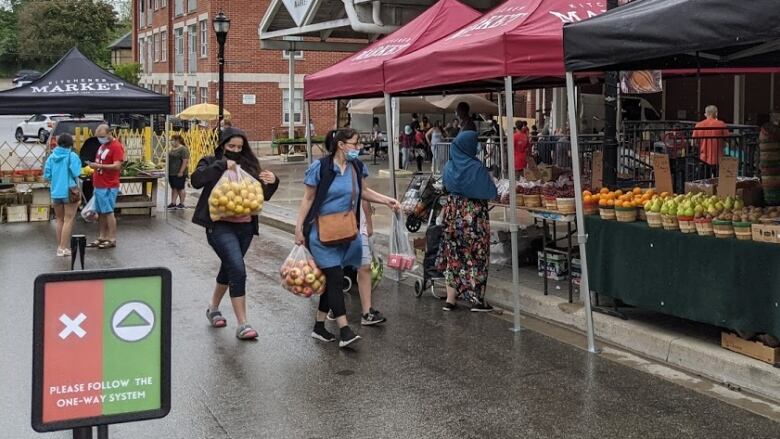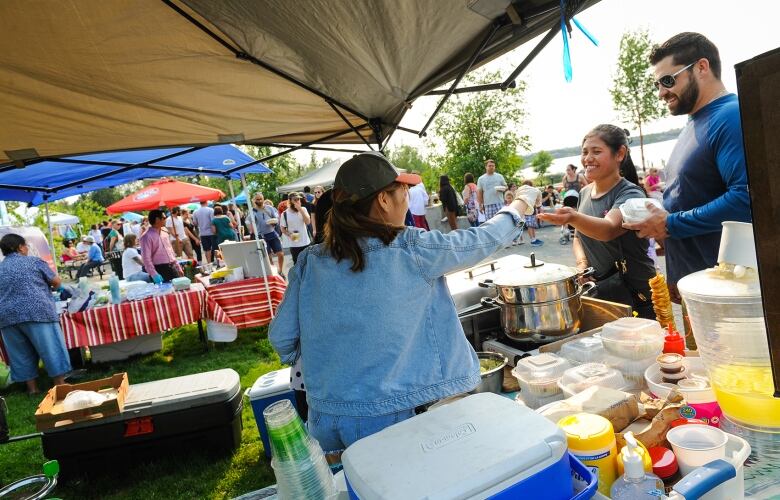Farmers' markets foster relationships with shoppers that can survive a crisis, Waterloo study finds
'Farmers' markets can play a role in keeping the community connected,' researcher says

During a crisis, farmers' markets not only keep people fed, they also help keep people connected to their community, a study from the University of Waterloo has found.
Researcher Josalyn Radcliffe, a PhD student in the university's school of public health and health systems, said that connection to the community continued even as many farmers' markets closed during the first wave of the COVID-19 pandemic and moved online.
"By building online communities through their social media and website tools, farmers' markets can play a role in keeping the community connected and supporting a sustainable and just food system through the pandemic and beyond," Radcliffe said in a release about the study.
In a study that was published in the open access BioMed Central journal Nutrition, Radcliffe looked specifically at the market in Yellowknife and talked to shoppers about the relationship they had with the market and how it was more than a place to shop for groceries.
The connection people feel to their farmers' market seen in that study is not a surprise to Sandra Moerschfelder of Fourfold Farms in Centre Wellington. The farm has had a stand at the Guelph Farmers Market since 1999. They switched to phone and online orders in March 2020 when the market closed temporarily. The market is now back each Saturday morning.
"I do think the key thing that people express that they miss about the farmers' market is the actual fact of, you know, sauntering through and lingering and chatting with everyone.
That's a big miss that the online does nothing for," Moerschfelder said.
"The online doesn't give you your community as you're walking around and munching on something or speaking to all the vendors that you love."
Social space
For the Yellowknife market, going online was a valuable tool to mitigate potential disruptions to people getting their food, but it didn't give everyone the experience they desired, says Kelly Skinner, a University of Waterlooprofessor who was involved in the study.
"One of the big things that came out as being really important for patrons of the Yellowknife farmers' market was that they were there to socialize and they were there to have dinner. And those two things, you know, being in that social space was really important to them," Skinner said.

Going online, there were some concerns about things like internet connectivity and challenges vendors might face with getting set up for online sales, Skinner said.
The desire to serve customers safely and maintain a relationship is something the Kitchener Market has strived to do over the last 14 months.
Cameron Dale, manager of the Kitchener Market, says pre-pandemic, the market made extra efforts to provide an experience to people that's beyond shopping from vendors. That has included cooking classes, music and dining options, some of which moved online during the pandemic.
They still miss and they want to engage with the experience that makes the market the market to them.- Cameron Dale, Kitchener Market
Earlier this year, the market announced a new pilot project that allows people to order their food online and pick it up at a central location. It's been successful and allows people to continue to have a relationship with the market even if they aren't ready to shop in-person there yet.
Dale says people reached out with other ideas for how they can interact with the market, including having delivery.
"We know that Kitchener is a growing city and there are going to be more and more people who want to access local food, but at the same time may not want that shopping experience that so many market lovers thrive on," Dale said.
"So for us, this has really opened a window into how we can broaden our core services post pandemic. So this isn't just something that we use for the now, but also allows us to serve that wider demographic, connect more people and ultimately help our businesses prosper."
WATCH|CBC K-W's Joe Pavia took this video when the Kitchener Market reopened in June 2020:
Markets important public spaces
Dale says the market has seen the benefits of online orders and they're really proud to have been able to offer it.
But, he says, they also hear from people who don't want it to become the new normal.
"I think the one thing it has highlighted is how many of our visitors and users don't want to go down that route because they still miss and they want to engage with the experience that makes the market the market to them," he said.
"I think that really goes to show how much more than food goes into a thriving public market. It's a community and it's an experience. And while we're looking forward to continuing to diversify our offerings in the future, I think it's a timely reminder of how important public spaces like this are for residents."












_(720p).jpg)


 OFFICIAL HD MUSIC VIDEO.jpg)
.jpg)



























































































